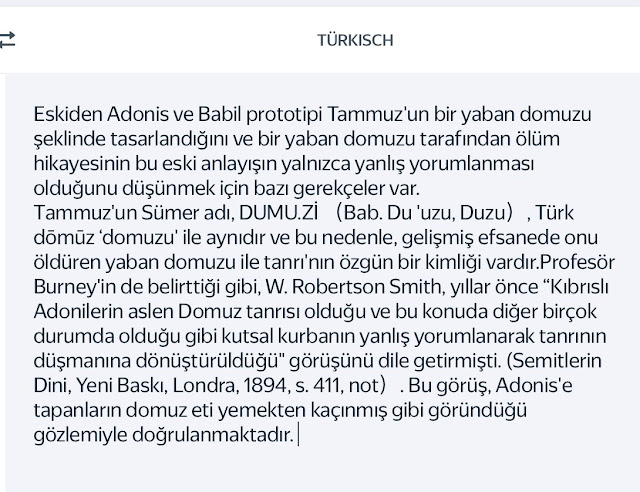.jpg) |
| Tonguz - Domuz - Toguz - Turkic word for Boar/Pig |
'Yunan' tanrısı Adonis, Sümer tanrısı Dumuzi/Tammuz'un ardılıdır. İskoç budun ve dilbilimci James George Frazer ikisinin de adını TÜRKÇE 'domuz'dan getirmiştir:
*
The 'Greek' god Adonis is the successor of the Sumerian god Dumuzi/Tammuz.
Scottish ethnologist and linguist James George Frazer named both of them from the TURKISH 'DOMUZ'(pig):
Bağlantı/Link: Apollodorus, Library Sir James George Frazer, Ed
*
Türkçe çevirisi:
*
Başka bir kaynakta ise şu bilgi vardır:
An other source says:
*
Adın Akdeniz havzasında dağılım süreci şöyle olmalıdır: Sümerce Domuz >Kıbrısça Adonis >?Etrüsk Atunis
*
The distribution process of its name in the Mediterranean basin should be as follows:
Sumerian Pig >Cypriot Adonis >?Etruscan Atunis
*
Özbeöz Türkçe olan Dongız'ın (İngilizce pig/boar) başına A gelip Kıbrıs tanrısı Adonis olması bir Hint-Avrupa dili geleneği olup, normaldir.
DONGIZ > DONIZ> A-DONIZ > Adonis
Kıbrıs alfabesi ile Türk alfabesinin benzerliği üzerine çalışmalarım, bu tezi destekler niteliktedir.
Görsel
*
It is an Indo-European language tradition and normal that Dongız (English pig/boar), which is essentially Turkish, is prefixed with A and becomes the Cypriot god Adonis:
DONGIZ > DONIZ> A-DONIZ > Adonis
My studies on the similarity of the Cypriot alphabet and the Turkish runes support this thesis, too.
Pic👇Turkish/Korean PIG
*
Ayrıca Sümerce'nin bir ağzı olduğuna inandığım Akkadca'da Dumuzid'in adı Duʾūzu, Dûzu biçimindedir. Anadolu'da bazı yörelerde domuza doğuz da derler. Gülensoy'un sözlüğüne göre Sarı Uygurca 'TOVIZ' dır domuz. Burada Türkçe ile paralel, ağızlar arası farkları görebiliriz.
Also, in Akkadian, which I believe is a Sumerian dialect, Dumuzid's name is Duʾūzu, Dûzu. In some regions of Anatolia, pigs are also called 'dowuz'. Yellow Uyghur TOVIZ means pig. Here we can see differences between dialects, parallel to Turkish.
*
Bence yaban domuzu ile ilgili Etrüsk tanrısı Atunis'in adı Yunanca'dan geçme olabilir ama olmayabilir de. O konuda araştırmam devam edecektir.
İlk etapta diyebilirim ki: Yunanca'dan alınmıştır büyük olasılıkla. Adının önündeki A bu tezi güçlendirir.
Bu üç tanrının bir ortak özelliği daha var: Üçü de dişi partnerleriyle beraber anılıyorlar.
Dumuzi + İnanna Adonis + Afrodit Atunis + Turan (Atunis hakkında çok az bilgi var www'de) * İnanna'nın adı bizim için önemlidir, hem ınan- kökü hem de ana sözcüğü yüzünden. Hitit tanrıçası, anaların anası Hannahanna'nın adı gibi.
Turan: Türe/Töre- den gelebilir.
*
I think the name of the Etruscan god Atunis, related to the wild boar, may come from Greek, maybe not. My research on that subject will continue...
But I can say that it is most likely taken from Greek. The A in front of his name strengthens this thesis.
These three gods have another common feature: All three of them are mentioned with their female partners.
Dumuzi + Inanna
Adonis + Aphrodite
Atunis + Turan (There is very little information about Atunis on www)
*
Inanna's name is important to us, both because of the root inan- (Turkic to believe) and the word mother (Turkic mother).
(Like the name of the Hittite goddess, the mother of mothers, Hannahanna).
Turan: It may derive from Turkic türe-/töre-: to be fertile, to breed.
*
*
'Domuzumuzun' kadın partnerleri:
The female partners of our 'boar':
Sonuç:
Sümerce'nin Türkçemiz ile ilgisi alaya alınıp reddedilmezse, birçok tanrı adının da Türkçe keşke sahip olduğu söylenebilir. Burada Türkçe DOMUZ'dan gelen, Sümer tanrısı Dumuzi/Tammuz'u ele aldım. Yanına da adı Türkçe ınan- ve ana olması olası dişi partneri İnanna'yı koydum (güvenilen/inanılan ana).
Etrüsklerideki karşılığı olan Atunis'i de ele aldım ve dişi partneri Turan'ın da adını Türkçe açıklamaya çalıştım.
Bence bu benzerlikleri görmezden gelmek, Batılı biliminsanlarının hep yaptığı şey, bilime saygısızlıktır.
*
Conclusion:
If the relevance of Sumerian to our Turkish language is not ridiculed and rejected, it can be said that many god names also have Turkish roots. Here I discussed the Sumerian god Dumuzi/Tammuz, which comes from the Turkish DOMUZ (pig).
Next to him, I placed his female partner İnanna, whose name could be derived from Turkic İnan- to trust/to believe - and ana (mother)
>(Trustable/Believable Mother).
I also discussed Atunis, its Etruscan equivalent, and tried to explain the name of its female partner, Turan, in Turkish.
I think ignoring these similarities, which is what Western scientists always do, is disrespectful to science.
*
Uzunbacak Adem
















No comments:
Post a Comment
Note: Only a member of this blog may post a comment.